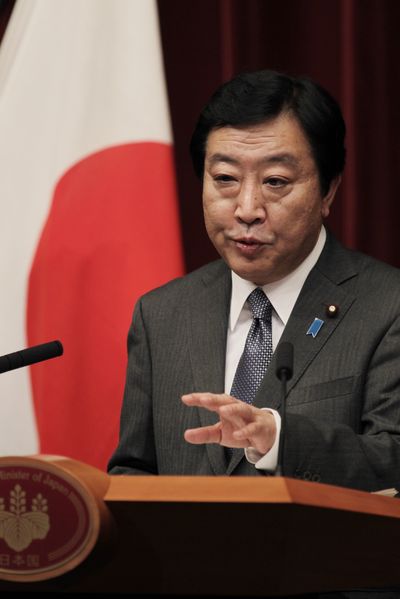Japan reactor now in‘cold shutdown’
Prime minister says radiation leak small

SEOUL, South Korea – The Japanese government declared Friday that the tsunami-stricken Fukushima Daiichi nuclear power plant had ceased to leak substantial amounts of radiation, achieving a condition that suggests a critical stable state known as a “cold shutdown.”
The announcement came more than nine months after the earthquake-generated tsunami struck the coastal plant March 11, knocking out its cooling system and eventually causing a series of meltdowns.
Prime Minister Yoshihiko Noda’s statement to Cabinet members was intended to reassure Japan and the rest of the world that the nation is moving beyond its nuclear nightmare. But critics say the plant, stricken by what many call the worst nuclear disaster since Chernobyl, is continuing to cause harm and that it will take decades to fully decommission it.
Officials say they can now move forward with assessing dangers at evacuation areas. In the days following the disaster, some 80,000 residents were evacuated from communities around the plant after the reactors spewed radioactivity into the air, sea and soil.
A 12-mile off-limits zone around the plant is expected to remain in effect for years.
Engineers said establishment of an improvised cooling system to circulate water through the damaged reactors helped create the more stable state. They have also set up a system to decontaminate water that becomes radioactive in the process.
But earlier this month, plant operators announced that 45 tons of highly radioactive water had leaked from that filtration system. Officials later acknowledged that some of that water had reached the Pacific Ocean.
Critics say the leak contradicted assurances that environmental damage at the plant 220 miles northeast of Tokyo had now been limited. The radiation in the water from the most recent leak measured up to 322 times higher than government safety limits for various types of cesium.
Environmentalists blasted the government’s claims of progress at Fukushima.
“By triumphantly declaring a cold shutdown, the Japanese authorities are clearly anxious to give the impression that the crisis has come to an end, which is clearly not the case,” Greenpeace said in a statement.